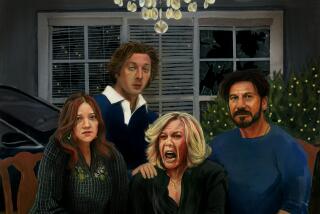Perfectly aboveground with their relationships
- Share via
Are you stuck in a bad relationship? Do you squabble constantly over nothing? Suspect your husband is keeping things from you -- like some previously undisclosed children? Sick of fielding undisguised hostility from your spouse’s family? Do you ever wonder if you’re playing for the wrong team? Is your new girlfriend getting possessive, maybe even stalker-ish? Is your new boyfriend testing the boundaries of your relationship in novel and troubling ways? Are you racked with guilt over how things ended with your ex?
If so, you might be a character on “Six Feet Under.” This season, the Fisher homestead (plus related satellites) has restyled itself into a kind of relationship dysfunction junction where the primary function seems to be to banish that over- and often misused word from our collective relationship vocabulary once and for all. “Dysfunctional” implies there’s a normative “function” from which unhealthy relationships stray.
Obviously there is no such thing, and lately “Six Feet Under” has set out to prove it, exploring a young relationship between two older people, an old relationship between two younger people and the double love life of one confused person. The lovers exist in a minefield of secrets, jealousy, longing and regret -- and, most destructive, the impossibility of pure, unmediated communication between two people.
One of the best things about TV dramas, particularly serial dramas stuffed like rush-hour buses with articulate, complicated characters, is their freedom to meander aimlessly in the entire realm of experience. There’s no thematic imperative waiting up for TV drama, wondering when it’s going to get to the point, demanding to know where it thinks it’s been and why. It’s in the nature -- and interest -- of the medium to drag things out. It’s also in our interest as viewers, provided the aimless meandering occasionally reflects our own lives. Movie drama at its best is a heightened distillation of human experience -- a reduction, a glaze, to stretch the culinary metaphor to its limit. TV drama, when it’s good, is more like a heightened meal extender. It’s the Hamburger Helper of human experience.
“Six Feet Under” always has been about the slow emergence of the characters from their various shells, but lately the mollusks have been going to town, and they’re all up in one another’s business. Ruth and her new husband, George (James Cromwell), have been regaling the whole house with their ecstatic late-night caterwauling, and the usually cool-as-a-garden-vegetable Keith (Mathew St. Patrick) has condescended to spend the night in David’s childhood bed. Claire, meanwhile, has been casting sidelong glances at her new girlfriend, Edie (Mena Suvari), who is a lesbian, while her previously thought-to-be-gay, now knitting-to-prove-he’s-not ex-boyfriend, Russell (Ben Foster), casts sidelong glances at her.
“I thought if we had a plan, we’d be free to deviate,” Ruth says to Claire, talking about a family garage sale she is trying to organize.
Claire gives her mother one of her withering art-school looks. “As long as we’re free to deviate,” she deadpans. She knows that her family and friends are taking full advantage of that freedom this season. It’s springtime on the Discovery Channel for Ruth (Frances Conroy), sons David (Michael C. Hall) and Nate (Peter Krause), daughter Claire (Lauren Ambrose) and Nate’s ex-girlfriend Brenda (Rachel Griffiths). They’re whipping off their glasses and undoing their librarian buns in unison.
In fact, Brenda’s sudden, uncharacteristic desire to have “normal sex” with Joe (Justin Theroux), her new boyfriend from across the courtyard, may be the best running joke of the season so far. Joe has waited patiently for Brenda’s sexaholic- recovery-mandated getting-to-know-you period to expire. When it’s over, he springs on her that he likes to be submissive in bed. He tries to explain.
“Normal sex, to me, is just ... “
“Boring sex,” says Brenda, giving up on her self-imposed (relative) asceticism just like that.
It’s a relief, because “Six Feet Under,” purportedly a show about death, has always really been more of a show about the opposite of death -- flux. Of all the serial TV dramas, it’s the one that best captures the constant negotiation that is monogamy, as well as the impossibility of “fixing” love relationships either materially or in time.
“Six Feet Under” always seems to want to remind us that “ever after,” happily or otherwise, happens only, you know, after.
More to Read
The complete guide to home viewing
Get Screen Gab for everything about the TV shows and streaming movies everyone’s talking about.
You may occasionally receive promotional content from the Los Angeles Times.






